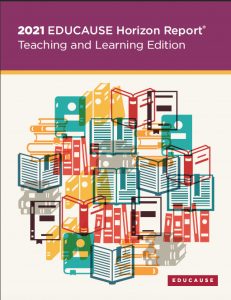Recently, the EDUCAUSE 2021 Horizon report was launched. Although the authors and panelists represent higher education, many of their findings, insights, and scenarios can be considered valid for other educational sectors and audiences as well, as those addressed in the project Digital Immigrants Survival Kit (DISK). This two-year project (DISK, 2019-2022, 2019-1-PT01-KA204-060898) aims to develop a Survival Kit to address missing digital competencies of adults with a particular focus on digital immigrants, i.e. individuals who are disadvantaged in society due to a lack of digital competencies and to empower them to take an active role in the digital society. In this context, the project team has identified needs and competence profiles among potential participants and is creating a set of 15 modules on different topics of daily life and digital competencies. The competence framework used in this DISK project builds on the DigComp2.0, DigComp2.1, and MyDigSkills frameworks from Europeana Commission. Those frameworks encompasses (i) Information and Data Literacy, (ii) Communication and Collaboration, (iii) Digital Content Creation, (iv) Security, and (v) Problem-solving.
The authors of the Horizon report claim that the COVID -19 pandemic has changed the landscape of higher education, which applies to the whole education sector, even adult education, and older learners are addressed in the DISK project. Although it remains to be seen whether these changes have taken root and will continue into the future, it is not difficult to imagine that in some important respects (for better or worse) education may never be the same again. Indeed, the potentially lasting effects of the pandemic played a large role in the discussions and nominations of our Horizon panelists this year as they identified the trends, technologies, and practices that will shape the future of teaching and learning. This report summarizes the results of those discussions and nominations and serves as a preview of where the post-pandemic future may be headed. This project was based on a modified Delphi method designed to elicit the collective perspectives and knowledge of a diverse group of experts, and the activities of the panelists were facilitated using tools adapted from the Institute for the Future.
Some of the trends identified are already being used in the DISK project and will continue to have an impact on its development and for its users, to name but a few, such as remote working/learning, the digital divide, blended and hybrid learning models, increased use of learning technologies and Open Educational Resources (OER).

Pelletier, K., Brown, M., Brooks, D.C., McCormack, M., Reeves, J., Arbino, N., Bozkurt, A., Crawford, S., Czerniewicz, L., Gibson, R., Linder, K., Mason, J. & Mondelli, V. (2021). 2021 EDUCAUSE Horizon Report Teaching and Learning Edition. Boulder, CO: EDU. Retrieved May 7, 2021, from https://www.learntechlib.org/p/219489/.
Five trends have been identified by the authors of the Horizon report
Social
– Remote work/learning
– Widening the digital divide
– Mental Health Topics
Technological
– Widespread Adoption from Hybrid Learning models
– Increased use of learning technologies
– Online Faculty Development
Economic
– Decreasing funding for higher education
– Demand for new/different workforce skills
– Uncertain economic models
Environment
– Climate change
– Reduction in travel to work
– Sustainable development
Political
– Increase in online globalization
– Rise of nationalism
– Public Funding for higher education
Key technologies and practices were also identified by the Horizon panelists. They felt that the following technologies and practices will have a significant impact on the future of teaching and learning in higher education:
– Artificial Intelligence (AI)
– Blended and hybrid course models
– Learning analytics
– Micro-credentialing
– Open Educational Resources (OER)
– Quality Online Learning
Foor scenarios were also pointed out by the authors; Growth, Constraint, Collapse, and Transformation
